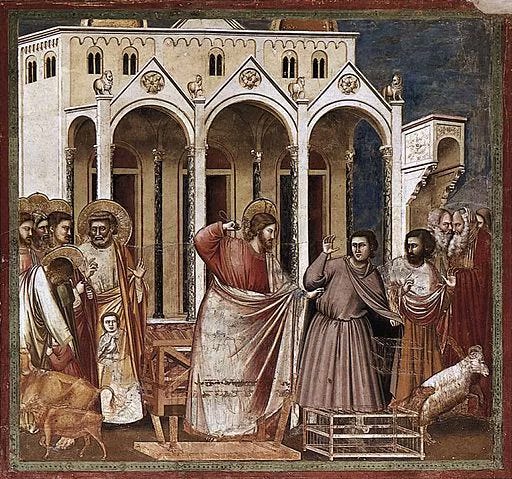Do We Sit at the Table or Turn it Over?
Holding grace and truth together in this cultural moment

Jesus was no stranger to controversy, and nowhere was this more evident than in the way He shared meals. Throughout His ministry, Jesus regularly dined with sinners, tax collectors, and social outsiders—people who, by religious and societal standards, were considered unclean, unworthy, or even outright enemies of righteousness. He ate with those who exploited others, those entangled in moral failure, and those whose lives were far from aligned with God’s law. To the Pharisees and religious elite, this was scandalous. How could a rabbi, a supposed teacher of holiness, break bread with the corrupt, the compromised, and the despised? Jesus did so intentionally, demonstrating that the kingdom of God is not entered by the self-righteous but by those who humble themselves, acknowledge their need for grace, and turn to Him in repentance.
But Jesus’ ministry was not only about sharing tables; sometimes, He overturned them. In striking contrast to His open-handed hospitality, Jesus entered the temple courts and forcefully drove out the money changers and merchants who had turned a house of prayer into a marketplace of exploitation (Matthew 21:12-13). His righteous anger revealed that while He welcomed sinners to repentance, He would not tolerate injustice, especially when it was disguised as religious devotion. This dual reality—Jesus’ willingness to dine with the morally compromised and His unflinching stand against corruption—challenges us to consider the fullness of His mission. He did not come to endorse sin but to call sinners to transformation. He did not seek comfort with the powerful but confronted those who used religion for personal gain.
Jesus’ example calls us to a discipleship that is both radically inclusive and boldly prophetic. He invites us to the table, no matter our past, yet He also demands a reorientation of our hearts, challenging the systems of greed, self-righteousness, and exclusion that often distort true worship. As we reflect on His life, we must ask ourselves: Are we willing to extend grace as freely as He did? And are we willing to stand for righteousness with the same courage?
When Do We Sit, and When Do We Stand?
This leads us to a question that feels especially relevant in this cultural moment: When are we called to sit at a table, and when are we called to overturn it? While the answer is layered, complex, and open to interpretation, there is a discernible pattern in how Jesus responds in both situations.
Jesus at the Table: A Posture of Invitation
Throughout the Gospels, Jesus sits at tables with tax collectors, sinners, and even Pharisees—always with an invitation to grace and transformation (Luke 5:29-32, Luke 7:36-50, Luke 19:1-10). His presence is an act of mercy, a call to repentance, and a demonstration that the kingdom of God is open to all who will receive it. Jesus’ seat at the table embodies redemptive love, demonstrating that true inclusion in the kingdom is always an invitation to transformation, not an endorsement of sin.
Jesus Overturning Tables: A Prophetic Rebuke
In contrast, when Jesus enters the temple and overturns the tables of the money changers (Matthew 21:12-13, Mark 11:15-17, John 2:13-17), He is not engaging in dialogue but delivering a prophetic act of judgment. The temple, meant to be a house of prayer for all nations, had been corrupted into a marketplace of exploitation, especially targeting the poor. By overturning the tables, Jesus publicly denounces the religious hypocrisy and injustice that had infiltrated a sacred space.
What Was at the Core of Jesus’ Response?
Jesus consistently engaged sinners with grace, recognizing that many were lost due to ignorance, brokenness, or deception rather than outright rebellion. Yet He reserved His strongest rebukes for religious leaders who knowingly misused God’s name, perverted justice, and burdened people with legalism. There seems to be a shift in Jesus' response when ignorance or curiosity regarding the kingdom is replaced with spiritual manipulation, abuse, or hard-heartedness. (Luke 4:14-30, John 6:25-71)
It's also important to remember, Jesus did not overturn every table He encountered. In fact, we can confidently say He sat at far more tables than He flipped. Yet many today invoke the image of Jesus overturning tables to justify their own anger and outrage. While anger itself is not inherently wrong, we must be honest: our indignation does not always qualify as righteous anger.
Righteous anger is rooted in truth, directed at sin and injustice, and ultimately reflects God’s holiness. However, unlike Jesus’ perfect anger, ours is easily tainted by sin, so we must ensure that it leads to godly action rather than bitterness, self-righteousness, or destruction. Jesus’ anger was perfect—ours, however, can easily drift into bitterness, self-righteousness, violence, or division. We must ask ourselves: Is our anger leading us toward love, justice, and transformation—or is it simply fueling our own resentment?
Practically speaking, what is easier, flipping a table or sitting at a table with people who aren't like you? For many people, they are content to flip tables because it's easier and doesn't require much sacrifice. (I fully realize that for some flipping tables is sacrificial). Please remember, we can't be content with just flipping tables but must be committed to creating spaces for people to authentically experience Jesus.
In the end, wisdom is found in discerning when we are called to sit and invite transformation—and when we are called to stand and overturn what is corrupt.
Father, give us the grace and compassion to continually invite others to the table and create space for transformation rather than condemnation.
Father, give us the courage and discernment to stand for justice and overturn religious hypocrisy while guarding our hearts from self-righteous and destructive anger.


